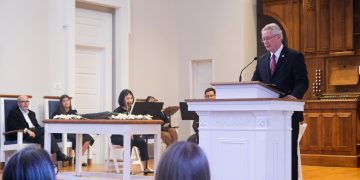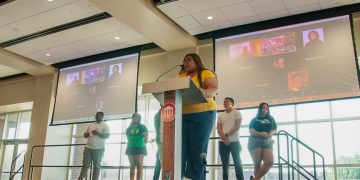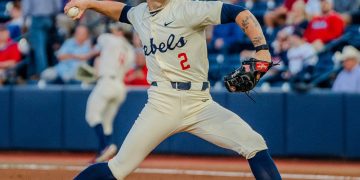
Local Oxford drag queens proudly shared their trials and triumphs in a colorful and candid Q&A discussion on April 30 at Lamar Hall. The event was hosted by LAMBDA — a support and discussion group for LGBTQ students on campus.
Max Luber, a Ph.D. student and co-leader of LAMBDA, said the organization put on the event to foster inclusivity and provide support for Oxford and university LGBTQ communities.
“LAMBDA has been a really great space for us to host various activities for the LGBTQ+ community,” Luber said. “It’s a very open space for everyone to learn and appreciate and It offers the opportunity to have a conversation with a drag queen in cases where they may never get a chance.”
The event, made possible through funding from University of Mississippi Diversity and Community Engagement, provided an opportunity to engage with drag performers and ask questions.
Among the panelists were Blake Summers, Vivica Vanity, Simone Stryker, Aetheria and Lady Pluto, each contributing their unique experiences to the discussion.
The drag performers shared their thoughts on the role that drag plays in their lives, the impact of “RuPaul’s Drag Race” on drag and more.
Summers recognized the importance of shows like RuPaul’s Drag Race on increasing awareness of inclusivity, though he warned about the risk of the show offering a narrow view of drag.
“’(RuPaul’s) Drag Race’ has impacted drag positively by pushing us more into the limelight and having more visibility and acceptance towards queer people in general,” Summers said. “But for the art form of drag itself, I think it’s kind of created an, ‘Oh, this is the one way that drag should be.’”
Summers said drag has played a special role in his search for identity and self-actualization.
“For me, drag has almost brought out a personality in myself that I feel like I’ve tried to keep hidden or not show as much,” Summers said. “I struggle with social anxiety a lot, and branching out and jumping into the drag scene has forced me to come out of my comfort zone.”
Stryker highlighted the platform that the television show gave for drag but not without the stress of comparison between performers.
“It definitely gave a platform to drag because before ‘(RuPaul’s) Drag Race.’ I hadn’t seen anything about drag at all growing up,” Stryker said. “But also when you’re starting out, you’re looking at those queens that you need inspiration from, but also you look at yourself and think, ‘Can I make that? Can I do that?’”
Aetheria was also vocal in both applauding the television show’s contribution and in cautioning how Drag Race may promote a uniform view of drag artists.
“I think Drag Race is an interesting thing that’s kind of come about in a positive way,” Aetheria said. “It has opened the doors for a lot of drag artists around the world, but I think it almost forces a standard for what drag queens should be.”
Aetheria said that drag serves many different artistic roles — combining creativity, performance and self-expression into one profession.
“It’s like a conglomerate of different skills coming together to create something magical,” Aetheria said. “Drag allows individuals to tap into their bravery and celebrate life in a way that is larger than life.”
Lady Pluto spoke about the struggles that Black drag performers have encountered in predominantly white venues.
“As a Black entertainer myself, it’s very hard, locally, to start up and be like, ‘Oh, hey, I want to start up here,’” Lady Pluto said. “I can’t go to certain bars and perform in certain ways because they’ll say, ‘This isn’t what people are used to seeing on TV.’”
Lady Pluto said drag is liberating, particularly in contrast to her everyday life.
“I consider myself non-binary and gender/fluid trans but the time I feel the most free is when I’m in drag,” Pluto said. “It feels like nothing is holding me back.”
Vivica Vanity discussed how drag integrates various art forms to convey emotions and experiences.
“Whether you paint your face (or) if you make your own clothes, you’re putting your emotions and your soul into this persona,” Vivicia Vanity said. “You can actually have your own heart on your body.”

























